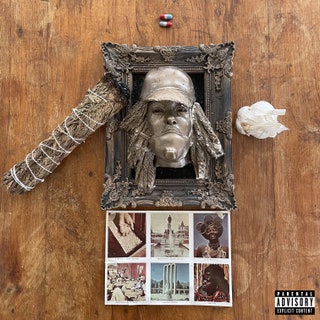Earl Sweatshirt used to make you sift through the mud to find the gold. On his latest album, the nuggets are gleaming right on the surface.
Since 2013, Earl Sweatshirt has been committed to drawing out his thoughts in the fewest words possible. Both his debut album, Doris, and 2015’s I Don’t Like Shit, I Don’t Go Outside refined the verbose rhymes the California rapper made his name on while under Odd Future’s wing in the early 2010s. His love of words remained but he was searching for clarity, a quicker route to the sources of his anguish: his then-damaged relationship with his mother; the loss of his grandmother in 2013 and his father in 2017; and the constant negotiations of being young, Black, and in the limelight. His latest handful of projects—2018’s firestarter Some Rap Songs and 2019’s foreboding Feet of Clay—settled into language both blunt and poetic while burying themselves in soupy vocal mixes and tar-soaked beats. Their lyrics ventured into the deep waters of Earl’s mind and funneled back undiluted grief, trauma, and joy.
Those thoughts haven’t gone away on Earl’s newest album, Sick!, but there’s more talk of acceptance, balance, and moving forward in the face of new challenges. “I came from out the thicket smiling,” he says on the opening “Old Friend,” like a man home from war. “Link up for some feasible methods to free yourself/Split it with my hand like cigarills.” Earl used to make you sift through the mud to find the gold. On Sick!, the nuggets are gleaming right on the surface. The raps are as thoughtful and tightly coiled as ever, but now he’s clearer and more confident, approaching his past and his future with hope.
Two of the album’s major influences—new fatherhood and the ongoing pandemic—represent Earl’s own pondering of the orbs of life and death. COVID looms over every song, with overt references to masks, vaccines, and isolation throughout, but the responsibility he feels for his son drives his response to this strange and perilous present. It’s what inspired him to scrap a more “optimistic” 19-track version of the project: “This has been another crash course in the fact that this shit ain’t about me no more,” he recently told Rolling Stone. Dread of COVID dovetails with the album’s broader understanding of truth as the remedy for whatever ails. “This game of telephone massive/I do what I have to with the fragments,” he says on “Tabula Rasa.” It’s urgent and calming all at once.
Regardless of the subject, it’s still a marvel to hear Earl rap. His writing has only grown more concise and his sharp wit and varied delivery conjure detailed images. “Titanic” is a truncated retelling of Earl’s return from Samoa in 2011 that flips references to the late MF DOOM and the biblical Book of Daniel into a tense collage of memories. The verse that closes out “Tabula Rasa” is a technical powerhouse; Earl stagger-steps through the crevices of Theravada and Rob Chambers’ creaky beat, elongating words and phrases for emphasis and creating his own carefully sewn pockets. He makes rewiring a song as it’s playing out—and keeping pace with world-class talents like billy woods and ELUCID of Armand Hammer—look easy.
Duality—nurturing new life while surrounded by death, reconciling old actions with new perspectives—powers the album’s every thought and action. The beats are split evenly between the lo-fi-adjacent work he’s favored for the past five years and the darker side of contemporary trap preferred by artists like Lucki (who Earl’s produced for in the past) and Young Nudy. Tempos and aesthetics change from song to song, sometimes from verse to verse. Alchemist’s more traditional-sounding sour horn loop on “Lye” melts into the synthetic horns and ticking 808s of Samiyam’s “Lobby (Int).” But it’s Detroit producer Black Noi$e who walks away with the MVP title, displaying enviable range over four beat placements—the kaleidoscopic snap of “2010,” the moody trap of “Vision” and “Titanic,” and the simmering guitar samples of “Fire in the Hole.” The whiplash of rap styles emphasizes Earl’s growing confidence in his craft, as does the decision to bring in legendary engineer Young Guru for a decidedly clean mixing job. Compared to Earl’s earlier work, Sick! is literally and figuratively crystal clear.
The title track ends with a quote from the 1979 documentary Music Is the Weapon, spoken by Afrobeat pioneer Fela Kuti: “As far as Africa is concerned, music cannot be for enjoyment. Music has to be for revolution. Music is the weapon.” Earl has used music as a weapon for reasons both intuitive and juvenile in the past, but on Sick!, he’s more capable and no longer holding back. Healed scars and lessons learned have pushed him to this point as much as love from his son and kindred spirits like New York rapper AKAI SOLO, who gets a shoutout on “Fire in the Hole,” and longtime friend Na-Kel Smith, who provides ad-libs on “Titanic.” They’re as vital to Earl’s revolutionary spirit as anything passed down from his parents or his surrogate brother, Tyler, the Creator. Sick! doesn’t recontextualize the genre in the same way Some Rap Songs did, but it’s an act of self-revolution. It magnifies a newly assured Earl Sweatshirt, skin shed and free to ascend.



0 comments:
Post a Comment